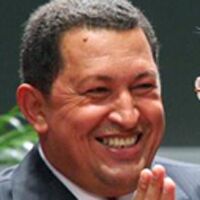
Hugo Chavez Assumes Dictatorial Powers
“Heil, Hugo” cry critics of Hugo Chavez’s expanded power. On January 31, Venezuelan lawmakers gave the president the right to rule by decree for 18 months. With his new powers, Chavez can remake 11 broadly defined areas of society, ranging from the economy to the justice system.
Shouts of “Long live President Hugo Chavez! Long live socialism!” filled a Caracas plaza after lawmakers turned over much of their authority to Chavez.
Officials in the United States are not as ecstatic their Venezuelan counterparts.
On the day the law passed, President George W. Bush said he is “concerned about the Venezuelan people” in an interview with Fox News. “I am concerned about the undermining of democratic institutions. And we’re working to help prevent that from happening,” he said (Associated Press, January 31).
However, Venezuela’s government claims it is strengthening democracy. “Dictatorship is what there used to be,” Venezuelan Vice President Jorge Rodriguez said. “We want to impose the dictatorship of a true democracy.”
Chavez plans to use his new powers to impose policies he has talked about since coming into office. Last month he announced his intention to nationalize the nation’s telecommunications and electricity industries, in which American corporations have large stakes invested. Now he has the power to do so.
“Let it be nationalized,” Mr. Chavez said of cantv, Venezuela’s largest telecommunications company, on January 9. “All that was privatized, let it be nationalized.”
Chavez also plans to gain greater control over the oil industry. A day after he was given the new powers, he said he was ready to sign a decree to nationalize oil projects in the Orinoco basin by May 1.
Exxon Mobil, Chevron, ConocoPhillips and British Petroleum have invested billions into upgrading heavy oil in the Orinoco basin. Chavez stated that state oil company Petroleos de Venezuela SA would take a stake of “at least 60 percent” in those oil projects. Foreign oil companies have already agreed to higher taxes and royalty rates in the past to insure a future return on their investment, and most analysts believe the oil companies will once again comply.
Estimates of the amount of oil in the basin run around 1.3 trillion barrels. Analysts believe that 300 billion barrels of those reserves are recoverable with today’s technology, which would give Venezuela the world’s largest oil reserves.
The U.S. has been importing more than 10 percent of its oil from Venezuela. Thus, the nationalization of Venezuela’s oil industry threatens America’s energy supply, if one believes Chavez’s anti-American rhetoric and stated desire to sell his oil elsewhere. Chavez’s power boost and his announcement about the telecommunications industry proves the U.S. should start believing what he says.
Since his election in 1999, Chavez has talked the talk, but now he is really starting to walk the walk. The nationalizations show a significant shift in Chavez’s economic policies as he is actually taking control of industries he had earlier allowed to operate freely. These nationalizations will not only give him greater power to fulfill his anti-American policies, they also could inspire his friends in Latin America, such as Brazilian President Lula da Silva and Bolivia’s Evo Morales, to follow suit.
The U.S. says it is concerned and is working to ensure democracy’s survival in Venezuela, but its efforts have failed to hold back Chavez. To understand why Chavez is a real problem and where this situation is heading, read “Latin America Swings Left.”
